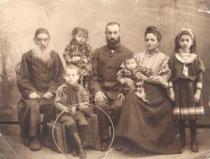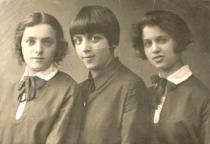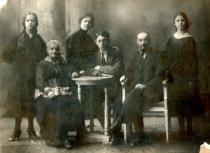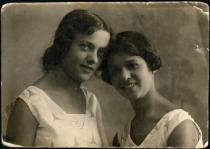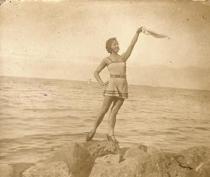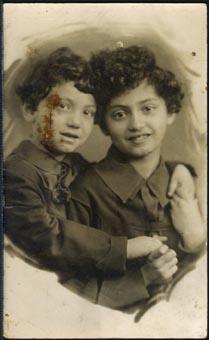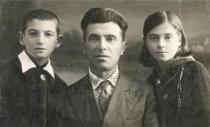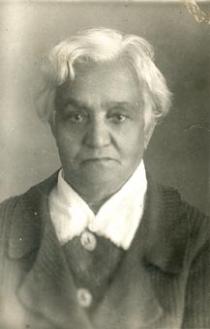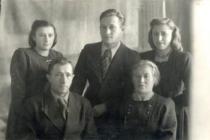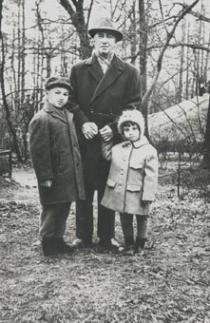This picture was taken in Leningrad in 1943. This is my maternal grandmother Tsilya Khodek, she is 69 here. I don’t know on what occasion the photo was taken, but one can figure it out from the time when it was taken: World War II. The tragedy of the war is reflected in grandmother’s face. I think this photo was either meant for some documents or to be sent somewhere to relatives.
All of my mother’s relatives come from boroughs not far from the town of Vitebsk - a rather large city in Belarus. Grandmother's name was Tsylya Khodek, nee Rukhman. She was not tall, with gray, beautifully set hair. She married grangfather in the 1900s. Grandfather Vulf Khodek worked for a container seller. His obligation was to mend the sacks and fix other containers. He earned about three rubles per month, which was very little, so their family was very poor. Grandfather was a very kind man and loved me and my sister very much. I remember him and grandmother together: she was short and he was tall and bald. She did not work as many women did in those days, and took care of the family. Tsylya had a small store downstairs in the same house where they lived, which worked around the clock. It was not a store in today's meaning; it was really a very small shop. It was possible to buy bagels and cakes there and various other small things. People could knock on the door at any time and ask for her. She would open up and give them what they asked for. However, the profit was small. Grandmother devoted the largest part of her life to the family, children and household, and the shop was simply an extra earning. There were four children in the family: three girls and one boy. All four were born in Vitebsk. Mother was the eldest, her name was Pesya, she was born in 1899 and died at the age of 95 in 1994. Her sisters' names were Khana (1907 - 1993), Lilya (1908 - 1954), and brother's name was Lev (1904 - 1942). There were also other children in the family but they died at a very young age.
Later, about 1897, they moved to Vitebsk. They lived near Vitebsk before in Smolyany shtetl. According to the family, they had a small house there, with a small garden full of flowers, because they had three daughters, who loved flowers very much. Certainly, there were no servants in the household and they had to do everything on their own. Grandmother was very strict and demanding. Everybody had their own tasks. My mother Pesya was the eldest in the family and she had to drag the washing to the river, to wash and take care of the small children. All the rest had various tasks depending on the time of the year: someone was responsible for watering the plant in the garden in summer and washed the floor in the house, when winter came; the other one helped mother to clean the house, and another one helped to mend the clothes. But the house was very clean. However, in spite of poverty, grandparents tried to provide their children with some education. I remember they even had some teacher, who came to the house and taught children minimal literacy: to read, write and count. The Khodeks had a lot of friends in Vitebsk and some of these friends, a family, left with them for Petrograd later on. They celebrated all holidays and attended the synagogue. I also remember that they lit the candles for Hanukah. Various delicious food was cooked, matzah, for example, which we ate instead of bread. After the meal we had fun and danced. Besides, we celebrated very merry holidays like Rosh Hashanah and the Torah Day [Simchat Torah], when we simply went to the synagogue and danced and had fun there. Grandmother cooked very well, she knew all Jewish cooking traditions. For example, she cooked very delicious stuffed fish. In general I remember grandmother to be very tidy, she was a very good housewife.
When the World War II broke out, grandmother stayed in Leningrad during the siege. Her second daughter Khana also stayed in Leningrad during the siege, she worked in a kindergarten as an educator all the time of the siege and helped children as much as she could. Grandmother died in Leningrad in 1949 when she was 75, and I was an 8th grade pupil. Her health was very much ruined by the fact that her only son Lev was murdered at the frontline during the World War II. He had very bad eyesight, and we don’t know for sure if he was taken prisoner-of-war or perished in the course of military actions.

